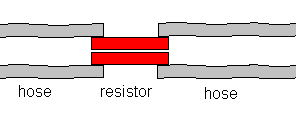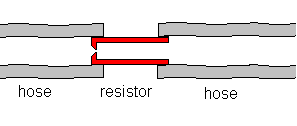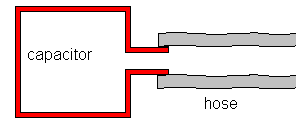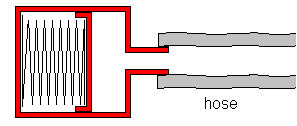Difference between revisions of "Pneumatics"
(→Elements: formatting into tables) |
|||
| Line 10: | Line 10: | ||
==Elements== | ==Elements== | ||
| − | === | + | {| |
| + | ===Resistors=== | ||
| + | |- | ||
| + | |style="width:60%;border:1px solid #888888;padding:5px 5px 5px 5px;"| | ||
====Laminar Flow Resistor==== | ====Laminar Flow Resistor==== | ||
| − | |||
This element has an effect upon flowing air just like a linear electric resistor has upon the flow of electrons. It is built from a metal tube of small diameter. The value of the resistance is linear and depends on the length of the element. | This element has an effect upon flowing air just like a linear electric resistor has upon the flow of electrons. It is built from a metal tube of small diameter. The value of the resistance is linear and depends on the length of the element. | ||
| − | + | |style="border:1px solid #888888;padding:5px 5px 5px 5px;text-align:right"| | |
| + | [[Image:PneumaticsLaminarFlowResistor.gif|Laminar Flow Resistor]] | ||
| + | |- | ||
| + | |style="border:1px solid #888888;padding:5px 5px 5px 5px;"| | ||
====Turbulence Flow Resistor==== | ====Turbulence Flow Resistor==== | ||
This element has an effect upon flowing air like a non-linear electric resistor, such as a diode. It is built from a metal tube that is closed at one end with a small puncture. The resistance depends on the flow. | This element has an effect upon flowing air like a non-linear electric resistor, such as a diode. It is built from a metal tube that is closed at one end with a small puncture. The resistance depends on the flow. | ||
| − | [[Image:PneumaticsTurbulenceFlowResistor.gif]] | + | |style="border:1px solid #888888;padding:5px 5px 5px 5px;text-align:right"| |
| − | + | [[Image:PneumaticsTurbulenceFlowResistor.gif|Turbulence Flow Resistor]] | |
| − | + | |} | |
| − | |||
| + | {| | ||
| + | ===Capacitors=== | ||
| + | '''This element is a vessel that can store an amount of air with more or less high pressure.''' | ||
| + | |- | ||
| + | |style="width:60%;border:1px solid #888888;padding:5px 5px 5px 5px;"| | ||
====Non-Linear Capacitor==== | ====Non-Linear Capacitor==== | ||
This is just an empty vessel. The accumulated air volume is non-linear with the pressure. | This is just an empty vessel. The accumulated air volume is non-linear with the pressure. | ||
| − | [[Image:PneumaticsNonLinearCapacitor.gif]] | + | |style="border:1px solid #888888;padding:5px 5px 5px 5px;text-align:right"| |
| − | + | [[Image:PneumaticsNonLinearCapacitor.gif|right|Non-Linear Capacitor]] | |
| + | |- | ||
| + | |style="border:1px solid #888888;padding:5px 5px 5px 5px;"| | ||
====Linear Capacitor==== | ====Linear Capacitor==== | ||
The cylindric vessel contains a piston that is held by a spiral spring. The accumulated air volume is linear with the pressure. | The cylindric vessel contains a piston that is held by a spiral spring. The accumulated air volume is linear with the pressure. | ||
| − | [[Image:PneumaticsLinearCapacitor.gif]] | + | |style="border:1px solid #888888;padding:5px 5px 5px 5px;text-align:right"| |
| + | [[Image:PneumaticsLinearCapacitor.gif|Linear Capacitor]] | ||
| + | |} | ||
| − | === | + | ===Inductors=== |
This element has an effect upon flowing air just like a coil has upon the flow of electrons. It is built from a metal tube of big diameter. The flowing air has a certain inertia, which causes a flow resistance for a little while after the pressure has switched on, and pushes the air forward for a little while after the inital pressure has switched off. A passive turbine inside the tube has an intensifying effect. | This element has an effect upon flowing air just like a coil has upon the flow of electrons. It is built from a metal tube of big diameter. The flowing air has a certain inertia, which causes a flow resistance for a little while after the pressure has switched on, and pushes the air forward for a little while after the inital pressure has switched off. A passive turbine inside the tube has an intensifying effect. | ||
| − | [[Image:PneumaticsInductance.gif]] | + | [[Image:PneumaticsInductance.gif|Inductance]] |
| − | === | + | ===Rectifiers=== |
Everybody knows this from a bicycle: The air valves of the wheel tube let the air flow in only one direction. | Everybody knows this from a bicycle: The air valves of the wheel tube let the air flow in only one direction. | ||
| − | [[Image:PneumaticsRectifier.gif]] | + | [[Image:PneumaticsRectifier.gif|Rectifier]] |
| − | === | + | ===Amplifiers=== |
There are various pneumatic amplifiers that act like an electronic transistor. | There are various pneumatic amplifiers that act like an electronic transistor. | ||
| − | [[Image:PneumaticsAmplifier.gif]] | + | [[Image:PneumaticsAmplifier.gif|Amplifier]] |
==Use cases== | ==Use cases== | ||
Revision as of 18:49, 26 November 2007
Pneumatics is a technology for automation. On Mars there are many processes to maintain in an artificial habitat, which needs automatic control and alarming. Pneumatics is an alternative to electronics and can provide exactly the same functionality and precision.
The things we are used to do with electronics are not really bound to the flow of electrons and the creation of semiconductors. Complex circuits can be constructed with flowing air instead of flowing electrons. This technology seems to be almost forgotten, and people tend to think of electronics as the only way of doing automation. On Earth it is easy to go to the electronics merchant and buy a handful of transistors and rectifiers. But on Mars? The settlers may not be able to build a transistor factory with all the costly technology required for making a transistor out of sand.
The functional elements of pneumatics are made from metal tubes of different diameter and length, vessels, gaskets from synthetic materials, etc. All this does not require hi-tech processes, and hence are easier to reproduce, making it an interesting alternative for automation technology on Mars.
Contents
Physical basics
- Air pressure is the analogon to electrical voltage.
- Flow of air is the analogon to electrical current
Elements
Resistors
Laminar Flow ResistorThis element has an effect upon flowing air just like a linear electric resistor has upon the flow of electrons. It is built from a metal tube of small diameter. The value of the resistance is linear and depends on the length of the element. |
|
Turbulence Flow ResistorThis element has an effect upon flowing air like a non-linear electric resistor, such as a diode. It is built from a metal tube that is closed at one end with a small puncture. The resistance depends on the flow. |
Capacitors
This element is a vessel that can store an amount of air with more or less high pressure.
Non-Linear CapacitorThis is just an empty vessel. The accumulated air volume is non-linear with the pressure. |
|
Linear CapacitorThe cylindric vessel contains a piston that is held by a spiral spring. The accumulated air volume is linear with the pressure. |
Inductors
This element has an effect upon flowing air just like a coil has upon the flow of electrons. It is built from a metal tube of big diameter. The flowing air has a certain inertia, which causes a flow resistance for a little while after the pressure has switched on, and pushes the air forward for a little while after the inital pressure has switched off. A passive turbine inside the tube has an intensifying effect.
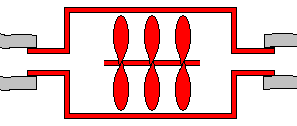
Rectifiers
Everybody knows this from a bicycle: The air valves of the wheel tube let the air flow in only one direction.
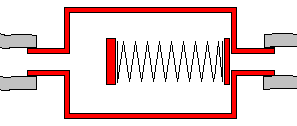
Amplifiers
There are various pneumatic amplifiers that act like an electronic transistor.
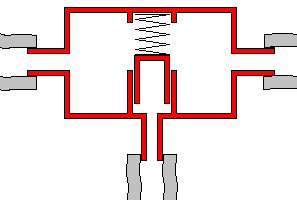
Use cases
- Temperatur control
- Air pressure control
- Timer for automatic watering in greenhouses
